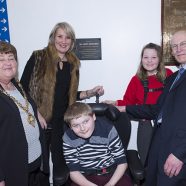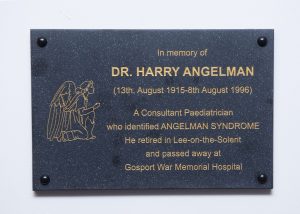
Angelman Syndrome Foundation Honors Dr. Harry Angelman With International Angelman Day Celebration
ASF partners with AS father and advocate to celebrate global strides in Angelman syndrome research, patient care
AURORA, Ill. (Feb. 15, 2019) – Today, in celebration of International Angelman Day on Feb. 15, the Angelman Syndrome Foundation (ASF) partnered with Angelman syndrome (AS) advocate and father Peter Patterson to honor Dr. Harry Angelman, the British pediatrician who first identified Angelman syndrome. More than 50 years after Dr. Angelman’s discovery of this rare neurogenetic disorder, a plaque commemorating the global impact of his accomplishments was unveiled at Gosport Memorial Hospital in the United Kingdom today.

Patterson, who lost his son to Angelman syndrome in 2003, campaigned for years to have Dr. Angelman’s achievements recognized in the U.K. Thanks to his dedication, the plaque now rests where Dr. Angelman passed, minutes from where he retired in Lee-on-the-Solent.
In recognizing Dr. Angelman’s work, ceremony attendees also reflected on how far the global research community has come since his discovery, as well as the now global accessibility of ASF Angelman Syndrome Clinics (AS Clinics), founded by the ASF to provide the specific treatments that are desperately needed by people with AS of all ages.
“Dr. Angelman spent his life committed to helping those with Angelman syndrome, and we continue to honor his legacy by advancing patient care through the ASF AS Clinics,” says Eileen Braun, executive director of the Angelman Syndrome Foundation and mother to a young woman with AS. “After decades of ASF-funded research spanning the globe, we are so much closer to a cure. We are proud to continue his legacy by working hard every day to support families and fund important research aimed at finding treatments and ultimately a cure for AS.”
Since 1996, the ASF has funded more than $10 million in research studying AS, the root cause of the disorder, potential therapeutics, and ultimately a cure. Of that, more than $2 million has funded researchers outside the U.S., including those in Australia, Canada, Israel, Japan, The Netherlands, and the U.K.
Most recently, the ASF, along with global partners, funded groundbreaking research to support the world’s largest newborn screening study for four rare genetic disorders, including AS. This pilot study, currently underway by Associate Professor David Godler from the Murdoch Children’s Research Institute in Melbourne, Australia, will validate the screening tool on a large-scale—ultimately leading to earlier and more accurate diagnosis, allowing therapies to be implemented at a much younger age.
“If we could have newborn screening for Angelman syndrome, it would help families by eliminating the diagnostic odyssey and having therapies available right from the beginning,” says Dr. Jessica Duis, MD, MS, Director of the Comprehensive Angelman Syndrome and Prader-Willi Clinics at Vanderbilt University Medical Center. “We know that if we implement these therapies early, that we will change the course of these disorders as we know them today.”
For Patterson, having an early diagnosis of AS for his son, Anthony, would have been life-changing. His family struggled for years without knowing what was wrong with their son, dealing with confusion and stress while battling the host of health challenges that come with AS.
“Dr. Angelman identified my son’s health issues,” said Patterson. “With his diagnosis, it was comforting to know what was wrong. I want his work to be recognized in hopes of supporting more families who are struggling with Angelman syndrome around the world.”

